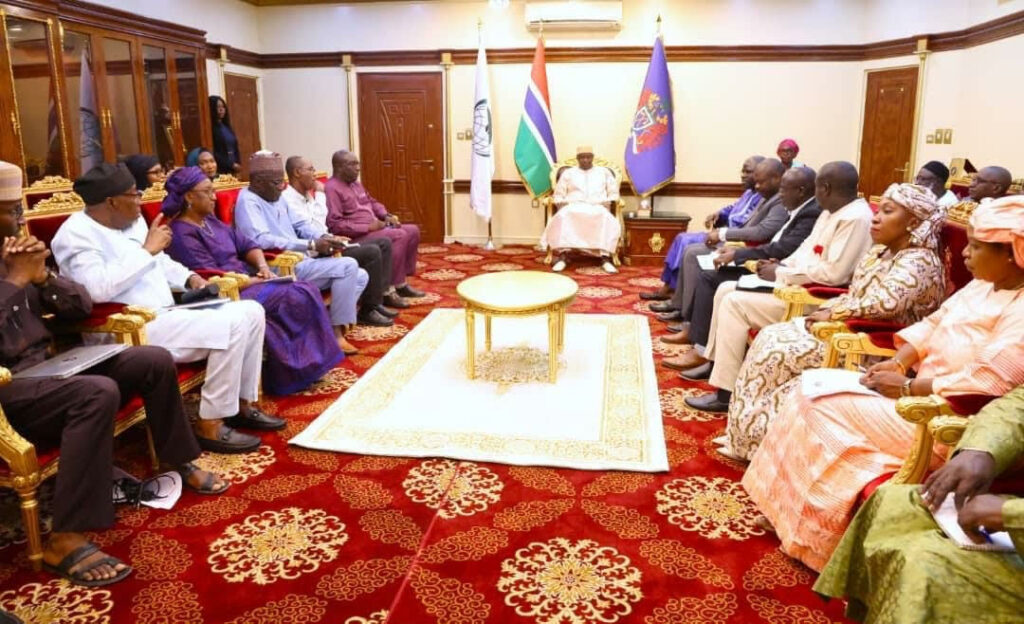
By Ramatoulie Jawo
The State-Owned Enterprise Regulatory Commission presented its recommendations regarding the National Water and Electrical Company (NAWEC) to President Adama Barrow on Wednesday.
Under Section 6(1) of the State-Owned Enterprise (SOE) Act, 2023, President Barrow appointed six Commissioners to the Commission. Enacted on April 25, 2023, the SOE Act established the State-Owned Enterprise Regulatory Commission to ensure efficient governance of state-owned enterprises, monitor their performance, oversee restructuring, appoint boards, and define their powers, duties, and functions.
In February 2023, President Barrow oversaw the signing of a Performance Contract between SOEs and the Ministry of Finance. This initiative is part of a new governance framework aimed at improving the performance of State-Owned Enterprises, enhancing service delivery, and contributing to national socio-economic development.
As part of its mandate, the SOE Commission prepared a report and recommendations on NAWEC’s performance.
Speaking to the media after meeting with the President, the Chairman of the State-Owned Enterprise Commission, Ousainou Ngum, provided an overview of the discussions on NAWEC’s performance report from the 2021-2022 performance contract.
“The Commission has reviewed the report and made a recommendation to the Executive for actions commensurate with NAWEC’s performance. The executive wanted to be briefed fully on the basis of the decision, the information we used to arrive at the decision, and NAWEC given the opportunity to also argue against the decision as they deemed appropriate, which they did. And the President in his wisdom made a final decision that he has now advised the commission to implement,” Mr. Ngum highlighted.
He further expressed gratitude for the process, which allowed all parties to express their views on the recommendations based on content and context.
“NAWEC in particular, had a very difficult context within which it operates, and they were able to elaborate on that very effectively which we listened to, and it also formed the information that our decision overall we are quite satisfied with the process and the manner in which the final outcome arrived at,” Mr. Ngum said
The Minister of Finance and Economic Affairs, Hon. Seedy Keita, acknowledged the President’s endorsement of the State-Owned Enterprise Commission’s recommendations, signaling a departure from the status quo.
“In the wisdom of His Excellency, we are very pleased that he is entrenching the reform agenda of the SOE and as such ushering in a new way to bring about accountability in terms of how the State-owned enterprises have been managed,” Hon. Keita expressed. Hon. Nani Juwara, the Minister of Petroleum and Energy, emphasized the crucial role of collective efforts from all state-owned enterprises (SOEs) in reaching the set objectives. He stated that the Commission’s goal is to assist the SOEs in enhancing their performance.
“So the intention of the government is very clear we have a good number of qualified, and experienced people who are Commissioners at the SOEs commission. We believe when all the SOEs work closely together with the respective Ministries and the Office of the President, the objective that we have set for ourselves to transform the State Owned Enterprise to be financially viable and to operationally efficient. I think we can achieve it in a very short time,” Hon. Juwara said.
Hon. Juwara commended the President for his foresight, stating, “This is the only way a country can do things differently because people must be accountable and the only way to do it is to make sure that there is a monitory mechanism and the SOE Directorate is doing exactly that on behalf of the government.”
Gallo Saidy, Managing Director of NAWEC, stated that the establishment of the SOEs Commission signals that it is no longer business as usual.
“Having the SOE commission set up looking at the performance measures and coming up with a report and recommendations and the President in his own wisdom has said there is no longer business as usual that he (President) is going to hold the institutions accountable and send that signal to every other institution that it is not business as usual. So we will be accountable for what we are asked to do. So it is our responsibility to now make sure that those measures that are put in place we try and make sure that we meet those targets,” Hon. Juwara said.
He emphasized that performance measures need to be realistic and achievable, and as long as they are, it is appropriate to hold institutions accountable.
“This is a very good signal. I would have said that I wouldn’t have liked to be punished, but this is the reality, and we do things to get the outcome. So they don’t happen to somebody who needs to be held accountable on that matter. My experience today is that going forward, we need to take it seriously. My entire Directorate was here, and they have got the message now, everybody needs to make sure they perform,” he added.
The Performance Contract covers several areas including service levels, financial obligations, operational efficiency, and human capital of the State-Owned Enterprises. It also includes a scoring matrix to evaluate their performance
